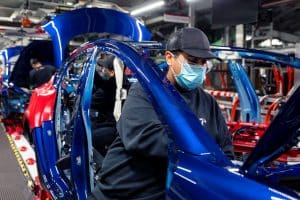- 🚢 Around 45,000 port workers from Maine to Texas went on strike due to stalled contract negotiations.
- 📉 The strike is significantly impacting automotive shipments, among other goods, like food and retail items.
- 💰 The USMX proposed a 50% wage increase, which the ILA rejected, calling it unacceptable.
- ⚓ The ILA strike affects key ports like New York and Houston, affecting half of the nation’s shipping.
- 💸 The strike could cost the U.S. economy around $5 billion per day, especially impacting automotive sectors.
- 🏗️ Marine terminals have closed, leaving about 100,000 containers stored at ports during the strike.
- 🌾 New York’s governor quelled concerns for essential goods, noting some shipments diverted to West Coast terminals.
- 🚗 Longer strikes could affect a broader range of industries, highlighting critical supply chain concerns.
The recent coastwide strike by port workers along the U.S. East Coast has sent shockwaves through various sectors of the economy. As approximately 45,000 workers cease operations from Maine to Texas due to unsuccessful contract negotiations, the consequences are massive and multifaceted. This blog post will dissect the nature of these effects, focusing on the automotive industry, the national economy, and the broader implications for supply chains.
The Catalyst: Stalled Negotiations and Major Unions
The strike is rooted in a breakdown of negotiations between the International Longshoremen’s Association (ILA) and the United States Maritime Alliance (USMX). Despite a proposed 50% wage increase from the USMX, the ILA deemed the offer unacceptable, leading to the first coastwide strike since 1977. For an industry built on precise timing and intricate logistics, this development has significant implications.
Major Impact on Automotive Shipments
The automotive sector, a cornerstone of American manufacturing, is particularly susceptible to the disruptions caused by the port workers’ strike. This sector is characterized by:
- Just-In-Time Manufacturing: Car manufacturers depend on the timely arrival of components to maintain production schedules. Delays induced by the strike could lead to factory shutdowns, reduced output, and financial losses.
- Import and Export Delays: Ports like those in New York and Houston are critical for importing vehicles and auto parts, as well as exporting finished products. Disruptions here ripple across the national and international markets.
- Increased Costs: With alternative logistics routes being more expensive or not feasible, automotive companies face rising costs, leading to potential price increases for consumers.
The implications for this sector underscore how localized labor issues can have broader economic consequences.
Economic Toll: A $5 Billion Daily Burden
According to analysts, the ongoing strike could potentially cost the U.S. economy around $5 billion per day. This financial burden falls heavily on:
- Logistics and Supply Chain: With marine terminals closed and around 100,000 containers stranded, logistic inefficiencies abound. Diverting shipments to other ports, especially those on the West Coast, poses its own challenges and costs.
- Retail and Food Industries: Beyond the automotive industry, goods ranging from retail products to perishable food items are at risk of spoilage and delay, affecting supply and prices nationwide.
- Macroeconomic Effects: Prolonged strikes lead to decreased productivity, diminished business confidence, and potential ripple effects, including stock market instability.
Widespread Impacts on Supply Chains and Essential Goods
Supply chains are highly interconnected, and their disruptions can lead to significant problems:
- Essential Goods Assurance: While New York Governor Kathy Hochul has reassured the public that essential goods, including food and medical supplies, have alternate routes, prolonged disruptions could complicate these logistics.
- Broader Industry Effects: From electronics to apparel, industries built on timely shipments face threats, highlighting vulnerabilities in the global supply chain networks.
Looking Forward: Mitigating the Impact and Moving On
As the industrial landscape evolves in response to these challenges, several steps can be considered:
- Improved Negotiation Frameworks: Establishing better channels for negotiation between unions and employers to avoid future conflicts.
- Diversification of Ports: Investing in infrastructure for less utilized ports to distribute the load more evenly and avoid bottlenecks.
- Strategic Reserve and Stockpiling: Methods for companies to mitigate the risk of delays by holding reserves of critical parts or materials.
Conclusion
The strike by coastwide port workers is a clear manifestation of how labor negotiations can provoke immediate and far-reaching economic consequences. By dissecting the effects on the automotive industry, the broader economy, and supply chains, stakeholders can identify potential solutions to buffer against such disruptions. As negotiations hopefully resume and progress, learning and adapting from this episode can fortify industries against future challenges.





